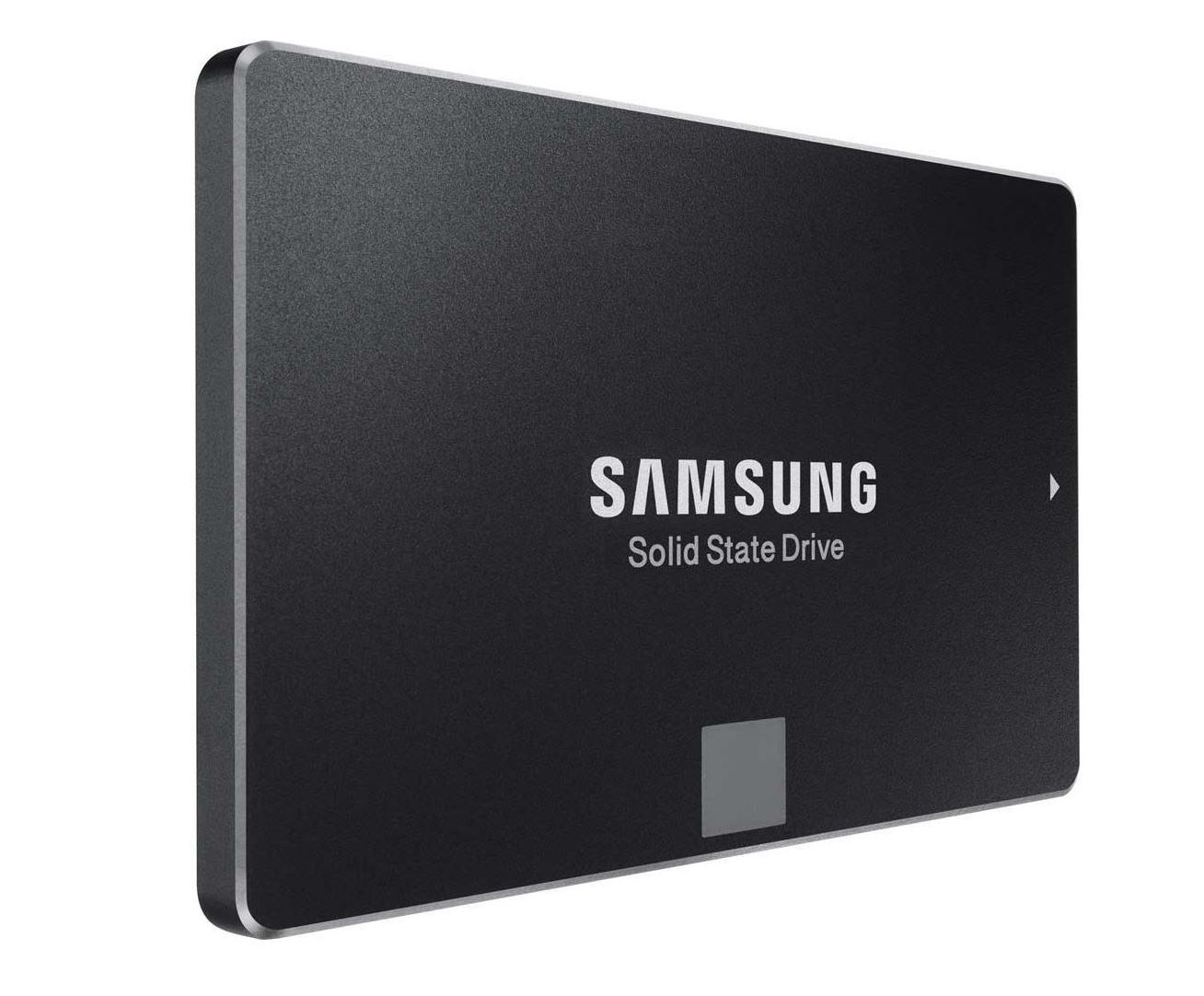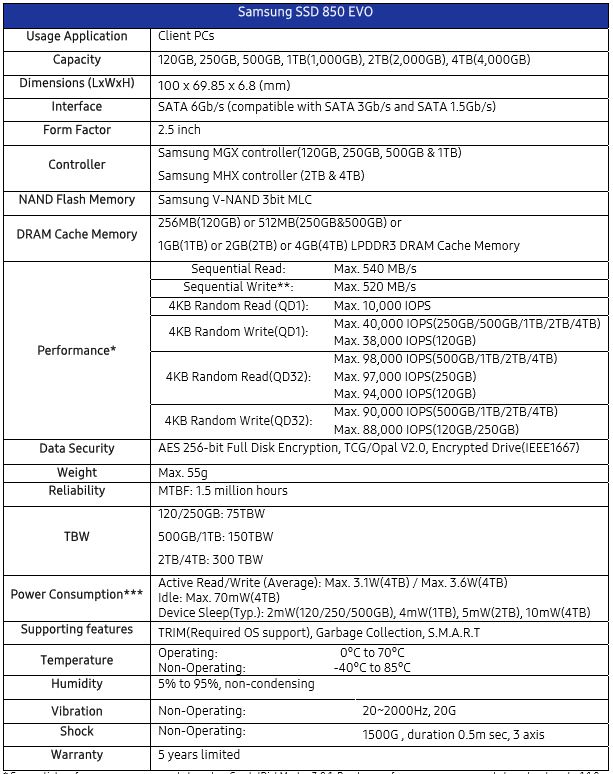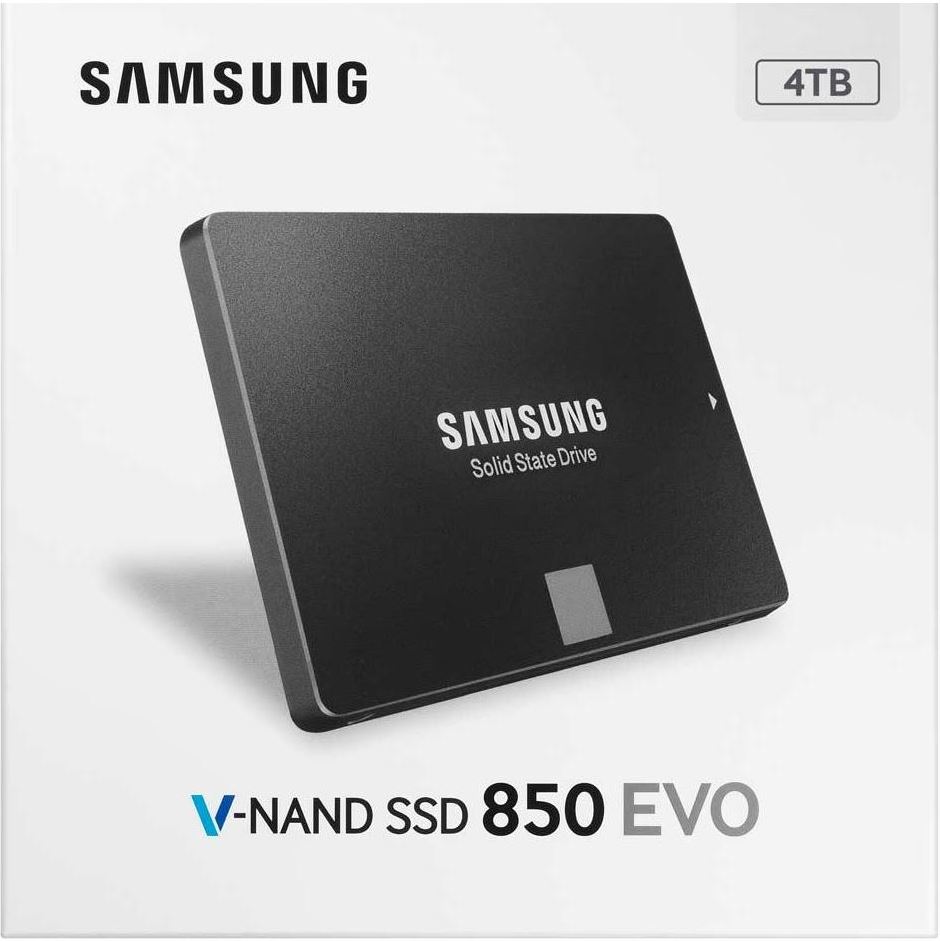Samsung 4TB 850 EVO SSDs Listed For Sale, We Have Detailed Specs And Pricing
We spotted a 4 TB Samsung 850 Evo for sale at adorama.com, and although Adorama may not be a household name, the company is one of the world's largest photography, video and imaging retailers. For now, it is also the sole holder of the unannounced Samsung 4 TB Evo. The discovery spurred a round of additional sleuthing that yielded a revised 850 Evo data sheet (May 2016) on Samsung's site. The datasheet lists the new 4 TB SSD, which confirms the new capacious SSD is legitimate and headed to a store near you.
Adorama lists the 4 TB Evo as utilizing 3D TLC (3 bit) V-NAND and boasting a top speed of 98,000/90,000 4K random read/write IOPS and up to 540/520 MBps of sequential read/write throughput. The performance specs are hardly groundbreaking and really just serve to illustrate how much the SATA 6 Gbps connection is limiting the current crop of SATA SSDs. Samsung also noted that it's optimized for client use, and listed the QD1 performance at 10,000/40,000 4k random read/write IOPS. This is a useful specification because the low queue depths is where the majority of consumer workloads reside.
The 4 TB of capacity is the big story, of course, and Samsung managed to cram the spacious digs into the standard 2.5" form factor with a 7mm Z-height (thickness). Adorama lists the 4 TB 850 Evo at $1,499, which works out to roughly $0.36-per-GB. Although that price is more than a mere pittance, you get AES-256, TCG/Opal 2.0 and IEEE 1667 encryption support, which makes this SSD particularly attractive for professional users with fat wallets. The SSD also supports Samsung's Magician software, which provides plenty of secondary benefits such as RAM caching, firmware updates and monitoring.
The new 4 TB Evo sports a 300 TBW endurance rating (0.55 Drive Writes Per Day), which is the same amount of TBW endurance found in the 2 TB model. SSDs with more capacity usually have higher endurance limits, so the unchanged endurance is surprising and may indicate a lower amount of overprovisioning. Samsung includes a five-year warranty, but as with other SSDs, the warranty expires when you surpass the endurance threshold.
Power consumption for larger SSDs is typically higher due to the additional components, but the 4 TB Evo seems to have that under control with a maximum of 3.1W/3.6W read/write. The drive also features a 70mW idle and 10mW Device Sleep rating, which is important for mobile use cases. The 4 TB model employs the MHX controller, which is similar to the 2 TB model. Samsung also doubled the 4 TB Evo's LPDDR3 DRAM allocation up to 4 GB.
We attempted to purchase the 4 TB 850 Evo, but Adorama informed us that it is on backorder, so we have no word on availability. However, the listing, price and detailed specifications indicate that release is imminent and when they are released it'll be worth checking to see if you can find an Adorama coupon to bring the price down.
Get Tom's Hardware's best news and in-depth reviews, straight to your inbox.

Paul Alcorn is the Editor-in-Chief for Tom's Hardware US. He also writes news and reviews on CPUs, storage, and enterprise hardware.
-
jimmysmitty Reply18245122 said:So... much... money...
:-)
For now. Intel and Micron should also have large capacity SSDs out later this year and then soon we should see lower end ones come out and help push the $/GB down. Once it gets to where you can buy a 4TB for $200 bucks I am jumping on one and finally having a single drive for everything again. -
stevenrix Yeah right, i have $1500 sitting down in my pockets right now, i 'll take 10 of them today because i am in a good mood.Reply -
Metteec Note the Terabytes Written (TBW), a measurement of drive endurance, or the number of TB you can write to the drive without it failing. For 500GB drive, the ratio of TBW to Drive Size (TB) is 300:1. For the 4TB drive, the TBW ratio is 75% less than the 500GB drive, at 75:1.Reply -
Brian_R170 I know larger SSDs have always commaded a premium, but I still expected something under $1000 the way current SSD prices are trending.Reply -
Decends Nothing like seeing the price tag of something expensive to wake you up in the morning.Reply -
Metteec While $1,500 seems like a lot, your closest competitor is the SanDisk Optimus MAX 4GB SAS SSD. The Optimus MAX is a more reliable drive, aimed at the professional server market, but commands a hefty price tag (~$2,200). The Optimus MAX is 500/500 MB/s Sequential Read/Write with 85K/11K Randon Read/Write IOPS (4KB). The key difference though is the 867:1 TB to TBW ratio (compared to 75:1 for the EVO), making the Optimus MAX substantially more reliable. I think at this price point, Samsung is targeting the enthusiast market with these specs. Regardless, I would recommend holding out. At CES back in January 2016, Mushkin unveiled its REACTOR 4TB SSD with a $500 price point. There are rumors that they plan to release the drive next month. Prices for the EVO 4GB are going to drop significantly, and I would not be surprised to see $900 with $100 MIR.Reply -
CRamseyer The reports of the Mushkin at $500 are wrong. One site published that price point but either misheard or Mushkin misspoke. The $500 price point was in reference to the 2TB model that Mushkin released just after CES. I wrote a news post about it right after CES to set the record straight.Reply
The TBW number only refers to the amount of data written that falls under the warranty period. Several studies have shown that TBW is a reference only for warranty periods. There are very few studies published that follow the true JEDEC standards for testing endurance. With that said, I can't say this drive will far exceed the warrantied TWB rating but Samsung memory lasts much longer than the low TBW ratings used for warranty purposes. -
USAFRet "OMG!! Too expensive."Reply
Couple years ago, how much was a 1TB SSD? $1000
Today? ~$220
This too will drop.


